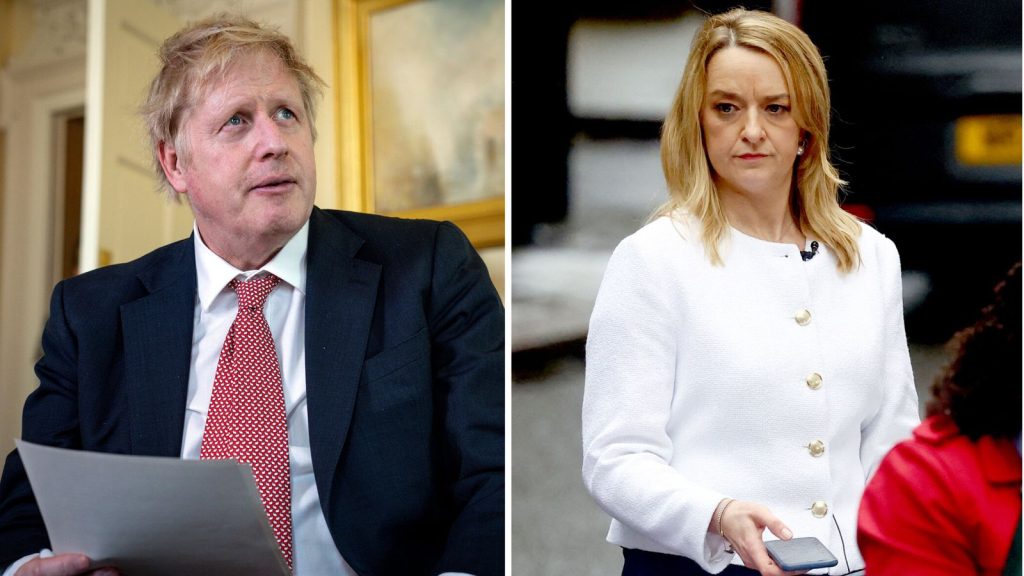Kuenssberg ’embarrassed’ by Johnson message error
3 min read

Boris Johnson was set to appear in a highly anticipated interview with Laura Kuenssberg on BBC One, scheduled for Thursday evening. However, the former political editor of the BBC found herself in a rather awkward position when she accidentally sent her briefing notes to Johnson instead of her colleagues. As a result, she deemed it inappropriate for the interview to proceed.
In her remarks, Kuenssberg expressed her feelings about the situation, calling it both “embarrassing and disappointing.” Despite the mishap, she emphasized the importance of transparency, stating, “Red faces aside, honesty is the best policy.” Following the incident, the BBC confirmed that both Kuenssberg’s team and Johnson’s representatives agreed that canceling the interview was the most sensible course of action.
The canceled interview was part of Johnson’s promotional tour for his new memoir, which has also been serialized in a newspaper. As a standard practice, presenters like Kuenssberg collaborate with research teams to prepare for significant interviews. This process often involves collecting biographical information, identifying potential controversies, and devising questions to guide the discussion.
In a statement posted on X, formerly known as Twitter, Kuenssberg explained the mix-up: “While prepping to interview Boris Johnson tomorrow, I accidentally sent our briefing notes to him in a message meant for my team. That obviously means it’s not right for the interview to go ahead.”
She elaborated on her frustration, acknowledging that the slip-up was more than just a personal embarrassment. “There are plenty of important questions to be asked,” she noted, indicating that the missed opportunity would affect the public’s understanding of Johnson’s tenure. However, she maintained a positive outlook, assuring her audience that she would return to her usual Sunday morning politics program.
The BBC later issued a formal statement confirming the cancellation: “Thursday’s interview with Boris Johnson won’t be going ahead. As Laura has explained, interview briefing notes meant for colleagues were inadvertently shared with him. This makes an interview tomorrow untenable. Under the circumstances, both the BBC and Mr. Johnson’s team have agreed this is the best way forward.”
Kuenssberg had previously highlighted the significance of the upcoming interview, noting that it would be Johnson’s first since his tumultuous exit from Downing Street. In light of the cancellation, the BBC adjusted its programming schedule, moving the popular soap opera EastEnders back to its regular time slot of 19:30 BST.
Despite the setback, Johnson is still scheduled to be interviewed by another BBC journalist, Matt Chorley, on Tuesday’s edition of BBC Radio 5 Live. This alternative appearance offers Johnson a chance to address questions and engage with the public, albeit in a different format.
The incident has sparked discussions about the importance of preparation and communication in journalism, especially when dealing with high-profile figures. Kuenssberg’s honesty about the mistake underscores the pressures faced by journalists in the fast-paced media environment. While the blunder is unfortunate, it serves as a reminder of the challenges inherent in political reporting.
In a media landscape where scrutiny is constant, the importance of maintaining integrity and professionalism cannot be overstated. This incident highlights the complexities that come with high-stakes interviews and the unforeseen challenges that can arise in the process. As Kuenssberg prepares for her next broadcast, the situation may lead to heightened scrutiny regarding how journalists manage sensitive information and prepare for interviews.
In summary, while the canceled interview represents a missed opportunity for both Johnson and the viewing audience, it also emphasizes the need for diligence and careful communication in the world of journalism. With the upcoming appearances and discussions surrounding his memoir, Johnson’s narrative will continue to unfold, offering future opportunities for engagement and dialogue.